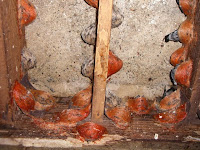All in all you need a bottle of your favourite Fendona at your disposal.
The reason being, it can actually clean up you BH from nearly all insects that prowled on the floors, the walls and the nesting planks.
Those that feed on the wood (termites) and also on the bird's blood (fleas, lices and ticks) will also be eliminated.
I was inside a BH with a pretty number of nests inside. When entered there were about 30 to 40 birds flying all around. I was very sure that once I am out of the place I will have itchy head, body and perhaps other parts that I are wet.
Yes after the trip my head was itchy, the skin of both hands were also with some kind of rashes and worst was those areas around my groin. It was terrible.
The owner told me that he forgot to apply those recommended insecticide and apologized for what happened to me.
My recommendation is to regularly apply the appropriate insecticide that will help to minimize those fleas, ticks and coakroached.
The best is the Fendona.
I have this interesting recommendations on how to use the Fendona effectively inside and outside the BH.
The best is to:
1) Laced the water inside your BH humidifiers with a cups of the Fendona liquid using it's bottle cup plus some EM. One cup will be good enough but add those EM solution to minimize any infection for every three to four months.
The moment you laced the water the mist spew by the humidifier will spread the fendona into the sky and spread inside the house.
This action will helps to spread the mist to both the floor, wall and the nesting planks.
The result will be seen within a few days. All spiders, cockroaches, ants, beetles, bugs and all animals with no backbones staying inside your BH will be dead.
(Received a few comments, positive and negative, so far. Some are not happy with the idea but some are very smart in coming out with alternative solutions. There is no different if you spray your BH with Fendona using the normal spray pump or laced the humidifier water with it. Both methods will give some effect to the nests in your BH. You can put little volume so that the amount of insecticide is minimum. Another recommendation suggested by a blog reader was to add a few ml of EM solution.)
(Received a few comments, positive and negative, so far. Some are not happy with the idea but some are very smart in coming out with alternative solutions. There is no different if you spray your BH with Fendona using the normal spray pump or laced the humidifier water with it. Both methods will give some effect to the nests in your BH. You can put little volume so that the amount of insecticide is minimum. Another recommendation suggested by a blog reader was to add a few ml of EM solution.)
2) If you need a more clever idea is by doing this interesting method.
 First get hold of those eggs paper holder. The paper holder that people used to transport eggs around.
First get hold of those eggs paper holder. The paper holder that people used to transport eggs around. Get a few of them and sandwich some hand crushed old newspapers in between two of the eggs paper holder.
Tie the sandwiched papers with any loose string. Make about four to 6 and once ready pour those Fendona on the top. Make sure you mix the fendona with water as per the manufacturer's recommendation. Let the poured solution seep downward and soak those papers in between and the lower egg paper holder.
Once done you can actually place these rinsed paper at a few strategic spots inside or outside your BH.
Those insect predators will be eating these paper and in no time they will be dead on the floor around the paper or those that much and take home their Queen will be also dead.
Try the above two techniques and I guarantee you that your BH will be free of those crawlers.
Remember Fendona will only affect those animals without back bones. It will not affect your birds, snakes, bats, lizards, geckos and you.
Remember Fendona will only affect those animals without back bones. It will not affect your birds, snakes, bats, lizards, geckos and you.
Have a good day...............
PS: Those who are totally against the use of Fendona please give you recommendations of any other chemicals that you think are less harmful to both the bird and the nests. Perhaps you might want to describe how best can those chemicals should be applied.
PS: Those who are totally against the use of Fendona please give you recommendations of any other chemicals that you think are less harmful to both the bird and the nests. Perhaps you might want to describe how best can those chemicals should be applied.
















































